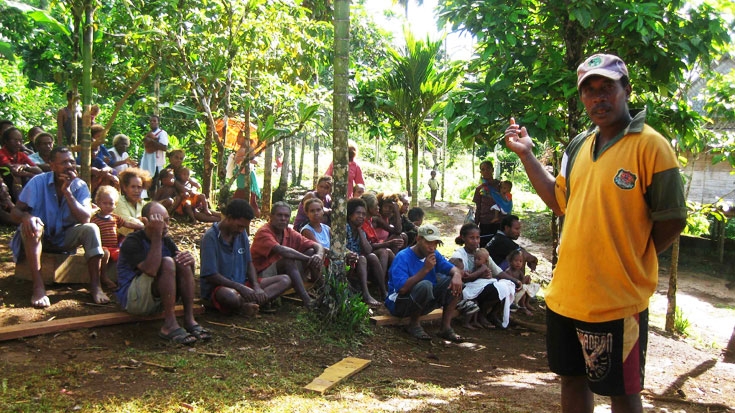What are rural Solomon Islanders’ main justice concerns?
- Grievances around land and natural resource transactions, in particular involving the exploitation of natural forests and prospective mining operations.
- Social order problems around efforts to manage gender and family conflict, youth behavior, and alcohol and substance abuse.
- Disputes arising from competition to access the benefits of development spending.
How are these problems being dealt with in Solomon Islands?
- There is very limited recourse for land and natural resource-related disputes. When local/customary authorities can handle these disputes, there is no guarantee they can resolve the disagreement and prevent conflicts. Further, they are often not equipped to handle these cases. Local courts, meanwhile, are highly dysfunctional and though caseloads are manageable, delays and cancellations are the norm.
- Social order disputes are by and large handled by local arrangements or not handled at all. This does not always work, however, as the legitimacy of chiefly authority is routinely challenged. In addition, women are consistently marginalized from dispute resolution, and the state – via the police and courts -- is unresponsive with regard to serious crimes (over which it has jurisdiction).
- Disputes over public spending are chronically difficult to handle because of the variety of fragmented mechanisms. Viewed locally, at best, these are handled in incoherent and inconsistent ways; at worst, they present multiple opportunities to compete and exclude, game the system and fuel networks of patronage, and successfully blur accountability for decisions. At present, Solomon Islanders “muddle through” despite the unsatisfactory resolution of their grievances and even of serious crime. However, they remain acutely aware of the potential for these grievances to trigger violence and would like to see more integrated and effective justice capabilities.
What could Solomon Islanders and their development partners do to improve justice outcomes?
These problems, which reflect binding, structural constraints and the imperatives of a shifting political order, have been impervious to decades of efforts at state institution building. A different approach is required, focused on: (1) fostering institutions that create linkages between citizens and the state around particular problems; (2) building on local innovations in which citizens and elites are evidently prepared to invest; and (3) promoting learning by doing, allowing for variation in accordance with Solomon Islands’ diverse landscape. Applied to the three problems:
- Social Order: Build on emerging innovations at the local level that create linkages between citizen, community and state to govern local social order issues. The World Bank-supported Community Governance and Grievance Management project seeks to do this through institutionalizing ‘Community Officers’. Addressing serious crime requires breaking through bottlenecks to establish an effective High Court committal process.
- Land and Natural Resources: Build on lessons learned from logging to promote effective institutional arrangements and capabilities to manage contests around deal-making (landholder identification, representation and negotiation); managing mining impacts (forums for renegotiation and redress); and benefit-sharing (allocation and quality of spending).
- Development Spending: Promote informed public debate about different ways of distributing and spending public revenue, especially as mining revenues are projected to increase significantly.
Download the publication here.
